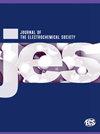与流池实验和模拟相结合的框架,用于了解化学转化处理中的蚀刻过程
IF 3.3
4区 工程技术
Q2 ELECTROCHEMISTRY
引用次数: 0
摘要
在这项研究中,一个新的框架将模拟和流动池实验结合起来,以定量了解化学处理反应的机理。利用这一框架,具体研究了弱酸和强酸诱导的蚀刻反应机理。为蚀刻实验开发了一个流动池系统实验。实验中使用了两种酸(HNO3 和 HF)以及不含电解质的 HNO3。测量了平均流速,并通过对流经流动池的溶液取样和使用电感耦合等离子体测量铁含量,确定了 Fe2+ 离子的摩尔通量。对流动池中的蚀刻反应进行了浓度场模拟。对边界层内的浓度场进行了可视化,以了解金属表面的 H+ 离子供应机制。在弱酸溶液中,H+ 离子主要通过解离提供。与此相反,在强酸溶液中,它们是通过扩散提供的。在距离金属表面 100 μm 的范围内形成了一个边界层。对实验和模拟的 Fe2+ 离子摩尔通量进行了比较。弱酸蚀刻的摩尔通量是强酸蚀刻的 10 倍以上。通过参数研究评估了 H+ 还原反应的反应速率常数。研究了旁观离子对蚀刻过程的影响。实验比较了使用含有不同浓度旁离子的 HNO3 溶液对铁板进行蚀刻的情况。结果证实,旁观离子浓度越高,蚀刻量越大。数值分析表明,电迁移项中的电场作用方向阻碍了 H+ 离子向金属表面的移动。虽然人们已经知道电迁移会抑制电极反应,但这项研究使其定量可视化和评估成为可能。本文章由计算机程序翻译,如有差异,请以英文原文为准。
Framework Integrated with Flow Cell Experiments and Simulations for Understanding Etching in Chemical Conversion Treatments
In this study, a new framework integrates simulations and flow cell experimentation to quantitatively understand the mechanism of chemical treatment reactions. Using this framework, the mechanisms of etching reactions induced by weak and strong acids were specifically investigated. A flow cell system experiment was developed for the etching experiment. Two acids (HNO3 and HF) were used, along with HNO3 without electrolytes. Average flow velocities were measured, and the molar flux of Fe2+ ions was determined by sampling the solution passing through the flow cell and measuring the iron content by using inductively coupled plasma. A concentration field simulation of the etching reaction in the flow cell was conducted. The concentration field within the boundary layer was visualized to understand the mechanism of H+ ion supply to the metal surface. In the case of weak acid solutions, H+ ions are primarily supplied by dissociation. In contrast, they were supplied by diffusion in strong acid solutions. A boundary layer formed within 100 μm from the metal surface. The experimental and simulated molar flux of Fe2+ ions were compared. The molar flux attributed to weak acid etching was more than 10 times that attributed to strong acids. The reaction rate constant of the H+ reduction reaction was evaluated through a parameter study. The influence of spectator ions on the etching process was investigated. An experiment was conducted to compare the etching of iron plates using HNO3 solutions with different concentrations of spectator ion. The results confirmed that the higher the concentration of the spectator ion, the greater the etching amount. Numerical analysis revealed that the electric field in the electric migration term acts in a direction that impedes the movement of H+ ions to the metal surface. While it is already known that electric migration inhibits electrode reactions, this study enabled its quantitative visualization and evaluation.
求助全文
通过发布文献求助,成功后即可免费获取论文全文。
去求助
来源期刊
CiteScore
7.20
自引率
12.80%
发文量
1369
审稿时长
1.5 months
期刊介绍:
The Journal of The Electrochemical Society (JES) is the leader in the field of solid-state and electrochemical science and technology. This peer-reviewed journal publishes an average of 450 pages of 70 articles each month. Articles are posted online, with a monthly paper edition following electronic publication. The ECS membership benefits package includes access to the electronic edition of this journal.

 求助内容:
求助内容: 应助结果提醒方式:
应助结果提醒方式:


